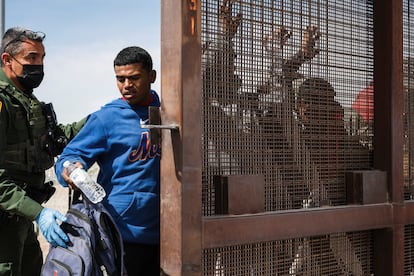Texas Senate Bill 4: What you need to know about the SB4 ‘anti-immigration’ law
The controversial law caused the Department of Justice to sue the state of Texas, alleging the bill goes against the U.S. Constitution

The Texas Senate Bill 4 is causing a strong controversy amid the U.S.–Mexico border crisis. The bill was signed into law by Republican Governor Greg Abbott, allowing state officials to arrest and deport migrants in Texas. However, the Biden administration has objected to it, alleging that the Constitution establishes that only the federal government can enforce immigration law.
On March 19, 2024, the U.S. Supreme Court permitted the law’s enforcement for several hours. However, nearing midnight, a lower court put the law on hold and scheduled a hearing on March 20. During the hearing, a three-judge panel interrogated the Texas solicitor general regarding the law’s specifics. Additionally, arguments from the U.S. Department of Justice and the ACLU were heard, advocating for its suspension. The law remains suspended as the appeals court deliberates.
What is Texas SB4?
SB4 is a Texas state law that establishes stricter measures for illegal migrants in the state. It criminalizes illegal entry into the territory and makes it a state crime, and allows authorities to arbitrarily detain people if they are suspected of being illegal immigrants.
Under the new law, state and local police may ask any person for their immigration papers or ID (regardless of whether they engage in suspicious behavior or not), and if they cannot prove their citizenship or legal immigration status, they would be at risk of being deported to Mexico under the authorization of a state judge, regardless of their country of origin.
Likewise, the law allocates 1.5 billion dollars for the construction of a border wall. Amounting to between 20 and 30 million taxpayer dollars for every mile.
Who is affected?
This new law concerns mostly illegal immigrants in Texas, since if they are detained they would be charged with a crime and the local government could deport them. However, the law would also affect Latino residents or residents of other minorities, since they could well be arbitrarily detained. Also, those illegal immigrants who have been in Texas longer and have not obtained citizenship or a residency permit could be deported.
The Mexican government issued a press release questioning the legal provisions that “affect the human rights of more than 10 million people of Mexican origin living in Texas”, which could lead to “hostile environments in which the migrant community will be exposed to hate speech, discrimination and racial profiling”, and rejected the possibility of receiving deported migrants. Both Joe Biden’s administration and the ACLU, as well as other civil rights groups, have stressed that immigration is a matter for federal authority and that Texas is violating the Constitution by seeking to implement SB4.
According to NPR, local authorities do not know exactly how the law will work, and some members have expressed doubts about possible scenarios, such as the course of action they would have to follow if they arrest a migrant who crossed into the U.S. through another state but was detained in Texas. Without appropriate provisions, migrant or racial minority communities could encounter a variety of problems if the law is implemented. SB4 calls for allocating resources such as jail space, Texas agents’ time and local tax dollars to work that has been the responsibility of the federal government. However, recent hearings have highlighted that there is still no clear organization to work together with U.S. Immigration and Customs Enforcement.
A report published by ImmigrationForum points out that the law could also affect the state in different ways: The strict stance on immigration enforcement could deter businesses, organizations and tourists from investing in or visiting the state, similar to what happened with Arizona’s SB 1070. In addition, it could reduce the economic contributions of immigrants in Texas, who play an important role in various industries and contribute billions to the state’s economy, among other problems.
History of the law
The first Texas SB4 is the Texas Senate Bill 4, which banned sanctuary cities in the state of Texas. According to GlobalRefuge, sanctuary cities have a policy that “discourages local law enforcement from reporting the immigration status of individuals unless it involves investigation of a serious crime.” Chicago is an example of a sanctuary city. Its Welcoming City Ordinance states that the city will not ask people about their immigration status, disclose that information to authorities, or deny city services based on their immigration status.
The law was filed on November 15, 2016, by Sen. Charles Perry. It was discussed during the regular season of the 85th Texas Legislature in early 2017, and was signed into law by Governor Greg Abbot on May 7, 2017.
In November 2023, the Texas Senate and the Texas House of Representatives voted for the Texas Senate Bill 4 state statute of 2024, which was signed by Governor Greg Abbot on December 18, 2023.
Originally scheduled to start on March 5, the implementation of the bill was postponed due to legal challenges from both the U.S. government and the ACLU. A district judge issued a preliminary injunction to halt the law’s enforcement pending further proceedings.
Texas appealed this injunction to the Fifth Circuit Court of Appeals, which sought guidance from the Supreme Court. Although initially allowed to proceed by the Supreme Court, the law was later blocked by the appeals court.
Currently, a hearing at the Fifth Circuit is underway to determine whether to maintain the district judge’s preliminary injunction, thereby continuing the block on SB4′s enforcement.
Senate Bill 4 is the subject of United States v. Texas, a lawsuit filed against the state, which alleges that the bill is anti-constitutional.
In January 2024, the Department of Justice sued Texas over SB4. District court judge David Alan Ezra ruled that the bill violates the Supremacy Clause of the United States Constitution. The conflict of laws clause establishes that the Constitution, federal laws made pursuant to it, and treaties made under its authority, constitute the “supreme Law of the Land,” which means that it takes priority over any conflicting state laws.
On March 19, 2024, the Supreme Court denied the petition made by the Biden administration and the city of El Paso to suspend the application of Texas Senate Bill 4.
Sign up for our weekly newsletter to get more English-language news coverage from EL PAÍS USA Edition
Tu suscripción se está usando en otro dispositivo
¿Quieres añadir otro usuario a tu suscripción?
Si continúas leyendo en este dispositivo, no se podrá leer en el otro.
FlechaTu suscripción se está usando en otro dispositivo y solo puedes acceder a EL PAÍS desde un dispositivo a la vez.
Si quieres compartir tu cuenta, cambia tu suscripción a la modalidad Premium, así podrás añadir otro usuario. Cada uno accederá con su propia cuenta de email, lo que os permitirá personalizar vuestra experiencia en EL PAÍS.
¿Tienes una suscripción de empresa? Accede aquí para contratar más cuentas.
En el caso de no saber quién está usando tu cuenta, te recomendamos cambiar tu contraseña aquí.
Si decides continuar compartiendo tu cuenta, este mensaje se mostrará en tu dispositivo y en el de la otra persona que está usando tu cuenta de forma indefinida, afectando a tu experiencia de lectura. Puedes consultar aquí los términos y condiciones de la suscripción digital.









































